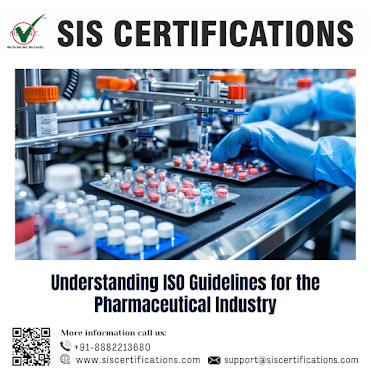The pharmaceutical industry operates under strict regulations to ensure the safety, efficacy, and quality of medicines. ISO (International Organization for Standardization) guidelines play a crucial role in maintaining these standards, providing a framework that helps pharmaceutical companies manage their operations efficiently while adhering to regulatory requirements. In this article, we’ll explore the key ISO guidelines relevant to the pharmaceutical industry and their significance in ensuring quality and compliance.
1. Introduction to ISO Guidelines
ISO is an independent, non-governmental international organization that develops standards to ensure the quality, safety, and efficiency of products, services, and systems. In the pharmaceutical industry, ISO guidelines are integral in areas such as quality management, risk management, environmental management, and data integrity. These guidelines help pharmaceutical companies meet regulatory requirements and improve operational efficiency.
2. ISO 9001: Quality Management Systems (QMS)
ISO 9001 is one of the most widely recognized standards globally, applicable across various industries, including pharmaceuticals. This standard provides a framework for establishing a Quality Management System (QMS), which is essential for ensuring consistent quality in pharmaceutical products.
Key Components:
Customer Focus: Ensures that customer requirements are met and satisfaction is achieved.
Leadership: Emphasizes the importance of leadership in establishing a clear vision and direction for the organization.
Process Approach: Advocates for a systematic approach to managing processes, ensuring efficiency and effectiveness.
Continuous Improvement: Encourages ongoing efforts to improve processes and product quality.
For pharmaceutical companies, ISO 9001 helps in establishing robust quality management systems that align with Good Manufacturing Practices (GMP), ensuring the consistent production of safe and effective medicines.
3. ISO 13485: Medical Devices
Although primarily designed for the medical device industry, ISO 13485 is also relevant to pharmaceutical companies that produce combination products (products that combine drugs and medical devices). This standard specifies the requirements for a QMS where an organization needs to demonstrate its ability to provide medical devices and related services that consistently meet customer and regulatory requirements.
Significance:
Risk Management: ISO 13485 places significant emphasis on risk management, ensuring that potential risks are identified and mitigated during the product lifecycle.
Regulatory Compliance: Helps organizations meet international regulatory requirements, which is crucial for global market access.
Pharmaceutical companies involved in the production of combination products can benefit from implementing ISO 13485 by ensuring compliance with regulatory standards and enhancing product safety.
4. ISO 17025: Testing and Calibration Laboratories
ISO 17025 is a standard that specifies the general requirements for the competence of testing and calibration laboratories. For pharmaceutical companies, this standard is critical as it ensures that laboratories produce precise and accurate test results, which are vital for quality control and regulatory submissions.
Key Aspects:
Competence of Personnel: Ensures that laboratory personnel are qualified and competent to perform tests.
Valid Testing Methods: Requires laboratories to use validated testing methods to ensure accuracy and reliability.
Traceability: Emphasizes the importance of traceability in testing, ensuring that results can be traced back to specific standards.
Implementing ISO 17025 helps pharmaceutical companies maintain high standards of laboratory testing, which is essential for ensuring the quality of raw materials, in-process materials, and finished products.
5. ISO 31000: Risk Management
Risk management is a critical aspect of the pharmaceutical industry, where the consequences of risk can be severe, affecting patient safety and regulatory compliance. ISO 31000 provides guidelines for managing risk effectively, offering a structured approach to identifying, assessing, and mitigating risks.
Core Principles:
Integrated Process: Risk management should be integrated into the organization’s overall management processes.
Customized Approach: The risk management process should be tailored to the organization’s specific needs and context.
Dynamic and Responsive: The risk management process should be dynamic, capable of responding to changes in the internal and external environment.
For pharmaceutical companies, ISO 31000 helps in managing risks across various areas, including product development, manufacturing, supply chain, and regulatory compliance, ensuring that risks are minimized and managed proactively.
6. ISO 14001: Environmental Management Systems (EMS)
Environmental sustainability is becoming increasingly important in the pharmaceutical industry, with companies being held accountable for their environmental impact. ISO 14001 provides a framework for establishing an Environmental Management System (EMS), helping organizations manage their environmental responsibilities in a systematic manner.
Benefits:
Compliance with Environmental Regulations: Helps organizations comply with environmental regulations and reduce the risk of non-compliance penalties.
Reduction of Environmental Impact: Encourages the adoption of practices that reduce the environmental impact of pharmaceutical operations, such as waste reduction and energy efficiency.
Enhanced Corporate Image: Demonstrates a commitment to environmental sustainability, which can enhance the organization’s reputation.
Implementing ISO 14001 enables pharmaceutical companies to manage their environmental impact effectively, contributing to sustainability goals and regulatory compliance.
7. Conclusion
ISO guidelines are indispensable tools for pharmaceutical companies, providing a structured approach to managing quality, risk, and environmental impact. By implementing these standards, pharmaceutical companies can ensure that their operations are efficient, compliant with regulatory requirements, and capable of consistently producing high-quality, safe, and effective medicines. As the pharmaceutical industry continues to evolve, adherence to ISO guidelines will remain a key factor in maintaining trust and credibility in the global market.



Comments
Post a Comment